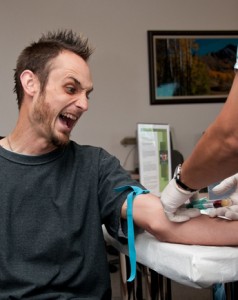Though I’m usually consistent with updating about once a week, this last week and a half has found me out of sorts. Apparently, some infection managed to get the better of my body for a while, and most of the available time I had went into managing my sickness and taking care of the most important tasks. Unfortunately, that also meant taking time away from writing, but now that I’m back on my feet I would like to offer some reflections on that rather grueling experience. One rather interesting – or annoying, if you’re me – facet of this last infection was the level of emotional intensity I found myself experiencing: I felt as if I wanted to be around other people while I was sick, which is something of an unusual experience for me; I found myself experiencing a greater degree of empathy with other people’s experiences than usual; I also found myself feeling, for lack of a better word, lonely, and a bit on the anxious side. Being the psychologist that I am, I couldn’t help but wonder what the ultimate function of these emotional experiences was. They certainly seemed to be driving me towards spending time around other people, but why?
And don’t you dare tell me it’s because company is pleasant; we all know that’s a lie.
Specifically, my question was whether these feelings of wanting to spend more time around others were being driven primarily by some psychological mechanism of mine functioning in my own fitness interests, or whether they might have been being driven by whatever parasite had colonized parts of my body. A case could be made for either option, though the case for parasite manipulation is admittedly more speculative, so let’s start with the idea that my increased desire for human contact might have been the result of the proper functioning of my psychology. Though I do not have any research on hand that directly examines the link between sickness and the desire for social closeness with others, I happen to have what is, perhaps, the next best thing: a paper by Aaroe & Petersen (2013) examining what effects hunger has on people’s willingness to advocate for resource-sharing behavior. Since the underlying theory behind the sickness-induced emotionality on my part and the hunger-induced resource sharing are broadly similar, examining the latter can help us understand the former.
Aaroe & Petersen (2013) begin with a relatively basic suggestion: solving the problems of resource acquisition posed an adaptive problem to ancestral human populations. We all need caloric resources to build and maintain our bodies, as well as to do all the reproductively-useful things that organisms which move about their environment do. One way of solving this problem, of course, is to go out hunting or foraging for food oneself. However, this strategy can, at times, be unsuccessful. Every now and again, people will come home empty-handed and hungry. If one happens to be a member of social species, like us, that’s not the only game in town, though: if you’re particularly cunning, you can manipulate successful others into sharing some of their resources with you. Accordingly, Aaroe & Petersen (2013) further suggest that humans might have evolved some cognitive mechanisms that responds to bodily signals of energy scarcity by attempting to persuade others to share more. Specifically, if your blood glucose level is low, you might be inclined to advocate for social policies that encourage others to share their resources with you.
As an initial test of this idea, the researchers had 104 undergraduates fast for four hours prior to the experiment. As if not eating for 4 hours wasn’t already a lot to ask. upon their arrival at the experiment, all the participants had their blood glucose levels measured in a process I can only assume (unfortunately for them) involved a needle. After the initial measurement, half the subjects were either given a sugar-rich drink (Spite) or a sugarless drink (Sprite Zero). Ten minutes after the drink, the blood glucose levels were measured again (and a third time as they leaving, which is a lot of pokes), and participants were asked about their support for various social redistribution policies. They were also asked to play a dictator game and divide approximately $350 between them and another participant, with one set of participants actually getting the money in that division. So the first test was designed to see whether participants would advocate for more sharing behavior when they were hungry, whereas the second test was designed to see if participants would actually demonstrate more generous behavior themselves. 
Way to really earn your required undergrad research credits.
The results showed that the participants who had consumed the sugar-rich drink had higher blood glucose levels than the control group, and were also approximately 10% less supportive of social-welfare policies than those in the sugar-free condition. This lends some support to the idea that our current hunger level, at least as assessed by blood glucose levels, helps determine how much we are willing to advocate that other people share with one another: hungry individuals wanted more sharing, whereas less-hungry individuals wanted less. What about their actual sharing behavior, though? As it turns out, those who support social-welfare policies are more likely to share with others, but those who had low blood-glucose were less likely to do so. These two effects ended up washing out, with the result being that blood glucose had no effect on how much the participants actually decided to divide a potential resource themselves. While hungry individuals advocated that other people should share, then, they were no more likely to share themselves. They wanted others to be more generous without paying the costs of such generosity personally.
So perhaps my sickness-induced emotionality reflected something along those same lines: sick individuals find themselves unable to complete all sorts of tasks – such as resource acquisition or defense – as effectively as non-sick individuals. Our caloric resources are likely being devoted to other tasks, such as revving up our immune response. Thus, I might have desired that other people, in essence, take care of me while I was sick, with those emotions – such as increased loneliness or empathy – providing the proximate motivation to seek out such investment. If the current results are any indication, however, I would be unlikely to practice what I preach; I would want people to take care of me without my helping them anymore than usual. How very selfish of me and my emotions. So that covers the idea that my behavior was driven by some personal fitness benefits, but what about the alternative? The pathogens that were exploiting my body have their own set of fitness interests, after all, and part of those interests involves finding new hosts in which to exploit and reproduce. It follows, at least in theory, then, that the pathogens might be able to increase their own fitness by manipulating my mind in such a way so as to encourage me to seek out other conspecifics in my environment.
The more time I spent around others individuals, the greater the chance I would spread the infection, especially given how much I was coughing. If the pathogens affect my desire to be around others by making me feel lonely or anxious, then, they can increase their own fitness. This idea is by no means far-fetched. There are many known instances of pathogens influencing their host’s behavior, and I’ve written a little bit before about one of them: the psychological effects that malaria can have on the behavior of their host mosquitoes. Mosquitoes which are infected with malaria seem to preferentially feed from humans, whereas mosquitoes not so infected do not show any evidence of such preferential behavior. This likely owes to the malaria benefiting itself by manipulating the behavior of their mosquito host. The malaria wants to get from human to human, but it needs to do so via mosquito bites. If the malaria can make their host preferentially try and feed from humans, the malaria can reproduce quicker and more effectively. There are also some plausible theoretical reasons for suspecting that some pathogen(s) might play a role in the maintenance of human homosexual orientations, at least in males. The idea that pathogens can affect our psychologies more generally, then, is far from an impossibility.
“We hope you don’t mind us making your life miserable for this next week too much, because we’re doing it anyway.”
The question of interest, however, is whether the pathogens were responsible for my behavior directly or not. As promised, I don’t have an answer to the question. I don’t know what I was infected with specifically, much less what compounds it was or wasn’t releasing into my body, or what effect they might have had on my behavior. Further, if I already possessed some adaptions for seeking out social support when sick, there would be less of a selective pressure for the pathogens to encourage my doing so; I would already be spreading the pathogen incidentally through my behavior. The real point of this question is not to necessarily answer it, however, as much as it’s to get us thinking about how our psychology might not, at least at times, be our own, so to speak. There are countless other organisms living within (and outside of) our bodies that have their own sets of fitness interests which they might prefer we indulge, even at the expense of our own. As for me, I’m just happy to be healthy again, and to feel like my head is screwing back on to where it used to be.
References: Aaroe, L. & Petersen, M. (2013). Hunger games: Fluctuations in blood glucose levels influence support for social welfare. Psychological Science, 24, 2550-2556.


Great !!!!!!!! I learned something new today